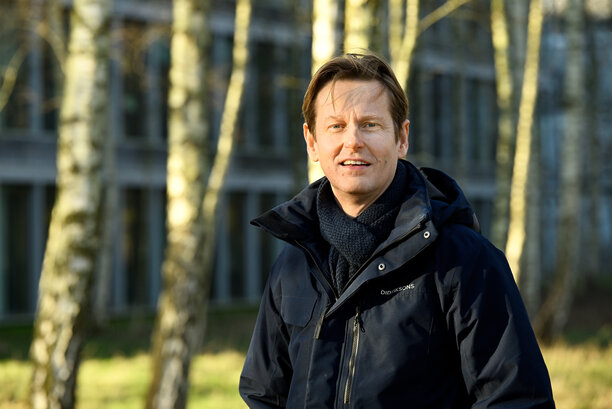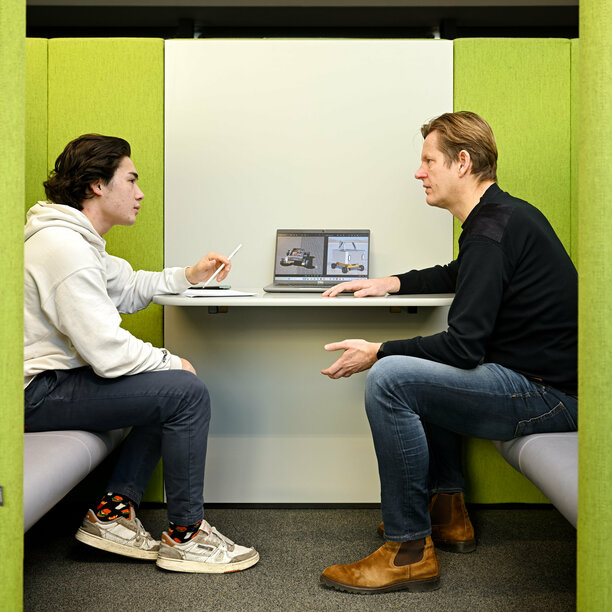‘We seek smart collaboration, challenging each other to improve and move forward’
As a part-time professor, Bergveld establishes links between business and university.
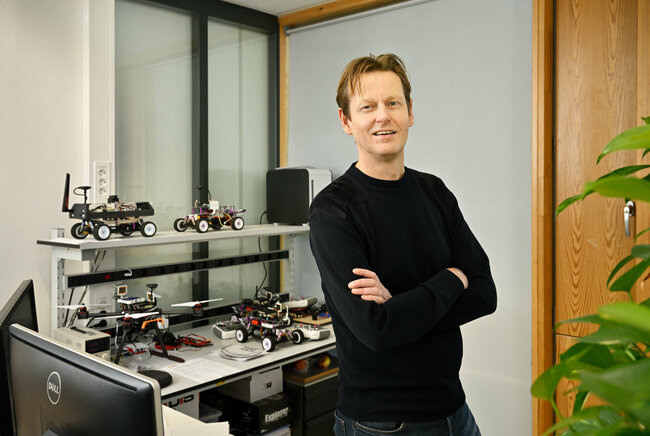
Collaboration with industry is in TU/e’s blood. Together, we reach further and contribute to the innovation ecosystem of the Brainport region, each in our own way. How do we shape that collaboration? What does it yield and why is it so important? And how do the parties relate to each other? In a series of stories, we highlight the collaboration between the university and industry. This time: the cross-pollination between NXP Semiconductors and TU/e. An interview with part-time professor Henk Jan Bergveld.
For 14 years, Henk Jan Bergveld has been a linking pin between TU/e and NXP. Four days a week, he works at the semiconductor company and, for one day, he is a part-time professor on behalf of NXP at TU/e’s Department of Electrical Engineering. In practice, he is constantly making links between the company, the university and the students.
From PhD to prof
Bergveld became acquainted with TU/e when he decided to turn his work on battery systems at what was then Philips Research into a dissertation. “Peter Notten, one of my colleagues with whom I had worked on battery models, was one of my two supervisors. At the time, he was a part-time professor at TU/e’s Department of Chemical Engineering & Chemistry and, a few years after my PhD, he asked me if I wanted to become a part-time professor at the Department of Electrical Engineering. That’s how I ended up in the Control Systems group in 2010 as a part-time professor in Embedded Control in Energy Management.”
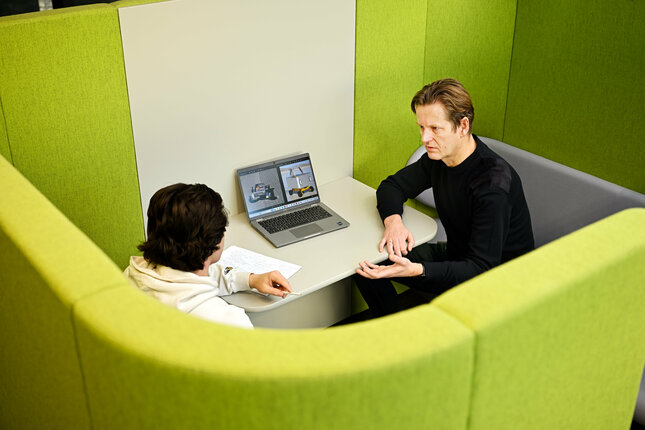
Supervising students
Bergveld “started with nothing” and, together with TU/e colleague Tijs Donkers, set up a research group dealing with battery models and battery management. He now defines research directions within this theme, secures research projects and the associated funding, and supervises students – from bachelor’s and master’s to PhD students.
“Our group investigates how you manage batteries in a system. We do this, for instance, using models and algorithms to estimate the internal state of batteries, which cannot be directly measured.”
Bridge builder
The part-time professor is employed by NXP, not TU/e. His employer lends him to the university, so to speak. Bergveld describes himself as a bridge builder and a layer of links between industry and the university. He tries to get the best out of the two worlds, uniting them to collectively move forward. How does he feel about wearing those two hats?
‘I see myself as a layer of links between industry and the university.’
Part-time professor Henk Jan Bergveld
“I think it’s absolutely great and I find it incredibly valuable. It goes both ways: because I work in industry, I can bring relevant themes that we struggle with into the research at TU/e. This makes the research at the university more relevant. In the other direction, I can apply the results of research done at TU/e that is of interest to NXP.”
Manpower
In addition, the collaboration between NXP and TU/e has benefits for both students and NXP. “We need good people. Because I move among students, I can bring good students to NXP for assignments or internships or for a job. I regularly think: hey, there’s a good one who can mean something to a suitable group within NXP. That doesn’t always work out because there has to be room to hire someone. But there are already examples of people who have come to work for us. That’s logical too: TU/e students come to the university to eventually end up in an interesting job.”
As another advantage, Bergveld mentions the network that you build up as a part-time professor. “As I’m in all kinds of projects at TU/e in which other partners are involved, I can also establish links there. For example, I work in projects with TNO and DAF, among others, and I have quite a network by now. So, I can easily establish valuable links with the work we do at NXP.”
Leash
In everything Bergveld does, he is focused on bridging education and industry. When asked whether NXP has a finger in the pie in research or education at TU/e, he responds with a definitive ‘no’.
‘As industry, we wish to specifically refrain from imposing things when it comes to the university’s research agenda. We do, however, provide nourishment and food for thought.’
Part-time professor Henk Jan Bergveld
“If TU/e were on the leash of industry, we would also be at the university a lot more, not just one day a week. I feel a lot of freedom from both NXP and TU/e. Of course, we do sometimes indicate from NXP that we would like it if research were done on this and that topic.”
“As NXP, we then provide direction on the broad strokes of such research and have regular consultations. The interpretation of the research is up to TU/e itself. This allows the university to come up with innovative solutions using the academic freedom required for this.”
No short term
“As industry, we wish to specifically refrain from imposing things when it comes to the university’s research agenda. We do, however, provide nourishment and food for thought. We also definitely don’t want TU/e to engage in short-term activities as we already do those ourselves. What adds value is when the university researches issues that are further away, developments for the long term. The more we get involved, the more university research will resemble what we do in business, which is often oriented to the short term. That doesn’t help us at all. What we actually do is seek smart collaboration, challenge each other to improve and move forward together.”
Loyalty
Because his employer NXP lends him to TU/e, Bergveld feels his loyalty lies primarily with NXP. “Of course, I also want my part-time professorship to work both ways: I’m constantly looking for things that deliver something for the university and the students as well as for my employer.”
‘I’m a showcase for NXP, but also make a strong case for TU/e.’
Part-time professor Henk Jan Bergveld
“I’m a showcase for NXP, but also make a strong case for TU/e. One example is that I can offer students a job or internship within NXP. Or that I can utilize the university’s research results for NXP if possible. In my opinion, this is exactly how collaboration should work. We both grow stronger from it.”
Two birds with one stone
An example of this is the NXP Cup, a competition for self-driving model cars that you can program. This is designed to give students hands-on experience with autonomous vehicles; the vehicles used in the NXP Cup offer students the valuable opportunity to use autonomous vehicle software in a competitive environment.
Autonomous model car competition
TU/e student teams did not previously compete in the NXP Cup and Bergveld therefore publicized the cup within the Control Systems group. He made a link between NXP and a TU/e colleague who gives a practicum on building autonomous cars. In that practicum, TU/e had run into some problems with the chips they were using.
The collaboration with NXP has now led to a plan to use the NXP Cup cars containing NXP chips, which will improve the practicum and allow students to gain experience with this type of system and receive support from NXP.
Helping student teams
Bergveld: “That’s the result of good collaboration. The same is also reflected in the support and sponsorship we provide from NXP to student teams such as Solar Team Eindhoven and TU/ecomotive. We are proud to support innovation in the automotive sector with technology, time and our products.”
More on our strategy
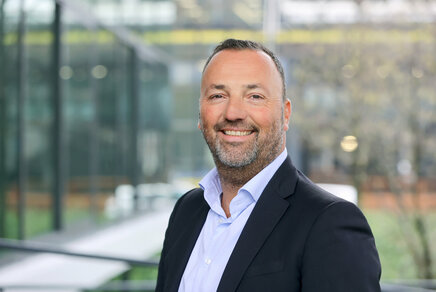

![[Translate to English:] [Translate to English:]](https://assets.w3.tue.nl/w/fileadmin/_processed_/c/f/csm_BvOF_2024_0319_AEV_license_TUe_Dirk_van_Meer_-_CORE_1__c976e259a5.jpg)
